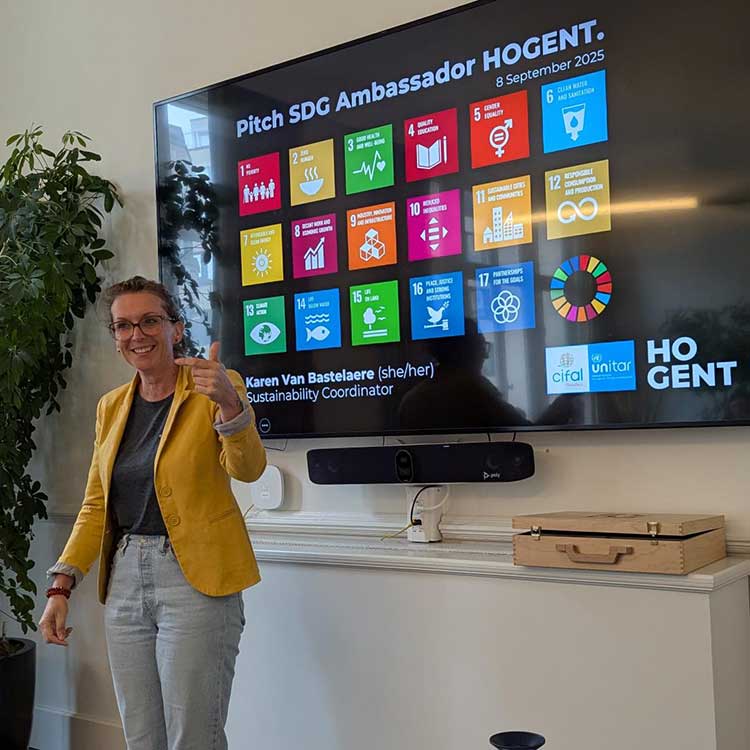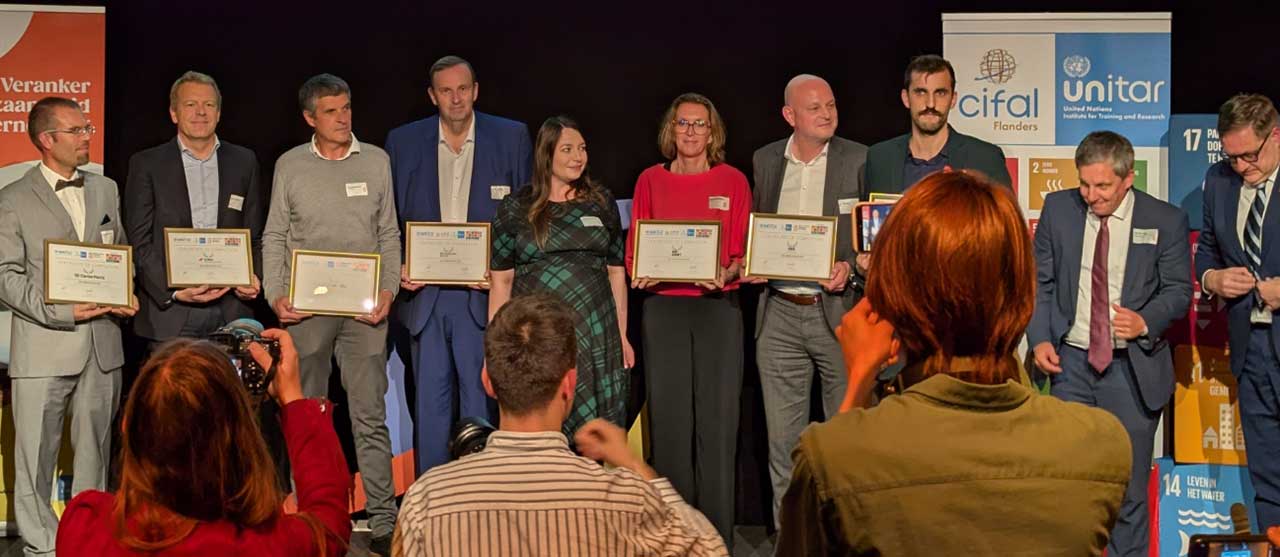During the Voka Sustainable Entrepreneurship Day, held on Thursday 23 October at Technopolis Mechelen, HOGENT received the SDG Ambassador certificate, a UN-related recognition. This is a reward for its consistent and thorough sustainability policy, which is guided by the SDGs (Sustainable Development Goals). HOGENT is the first university of applied sciences in Flanders to be awarded the title of SDG Ambassador.
The recognition as SDG Ambassador is the third and final step in a process towards a sustainability strategy and policy that HOGENT launched in September 2021 in collaboration with CIFAL Flanders, a training and expertise centre in the field of Sustainable Development Goals (SDGs) affiliated with the United Nations. At the same time, it is an incentive and a mandate to continue on the path HOGENT has taken.
The process led to various actions and policy decisions which two years later (November 2023) resulted in recognition as an SDG Pioneer and, barely a year later, the SDG Champion certificate. This swift evolution was the result of HOGENT's sustained and valued efforts in the areas of climate resilience (including a strong focus on biodiversity, soil softening and management, and CO2 reduction), but also in the areas of sustainable mobility and inclusion, integrity and human rights (for example, in collaboration with partners from a number of African countries with which HOGENT has developed education and research projects). The fact that sustainability has been structurally embedded in the research centres for many years also contributed to the recognition.
Broad support
From the very start, HOGENT also chose to involve employees from as many parts of the organisation as possible, as well as students – who, among other things, helped to establish the Sustainable Office in 2023 – in order to give substance to its sustainability policy and ensure that it enjoyed broad support.
Recognition as an SDG Ambassador is not just about ticking off a list of points for attention. An international jury critically examined the sustainability policy that had been drawn up and assessed, among other things, how it was integrated into the overall organisational strategy and what concrete improvements it had led to.
Master plan
HOGENT's sustainability policy encompasses various perspectives and does not stand alone, but is embedded in virtually all aspects of the strategy. For instance: the procurement policy is linked to the sustainability and inclusion policy. Infrastructural changes are also subject to a sustainability assessment in advance. Good examples of this are the surroundings of building T and the major renovation work on building C on the Schoonmeersen campus.
‘“Seeing how these infrastructure works were tackled, integrating elements such as water management, mobility and biodiversity, one cannot but conclude that we have achieved many tangible changes and improvements,” says sustainability coordinator Karen Van Bastelaere, who received the SDG Ambassador certificate.
This interconnection between infrastructure, spatial perception and sustainability in all its aspects is carried on in the infrastructural master plan for the Schoonmeersen campus, which was approved earlier in 2025. In the long term, this master plan provides for a number of additional buildings, but also for more meeting and relaxation areas, greening, biodiversity and attention to the neighbourhood, whereby all these aspects do not interfere with each other, but rather reinforce each other.
Ambassador
She emphasises that HOGENT received a great deal of support during the process from colleagues at Ghent University and other higher education institutions who shared their experiences in this area and with whom they regularly collaborate. Collaboration and sharing is something HOGENT wants to do even more than before: ‘That is an intrinsicpart of the title of SDG Ambassador. Being an ambassador means inspiring, being a pioneer, sharing experiences and knowledge,’ Karen Van Bastelaere explains.

“Seeing how these infrastructure works were tackled, integrating elements such as water management, mobility and biodiversity, one cannot but conclude that we have achieved many tangible changes and improvements.”
Karen Van Bastelaere, sustainability coördinator HOGENT
